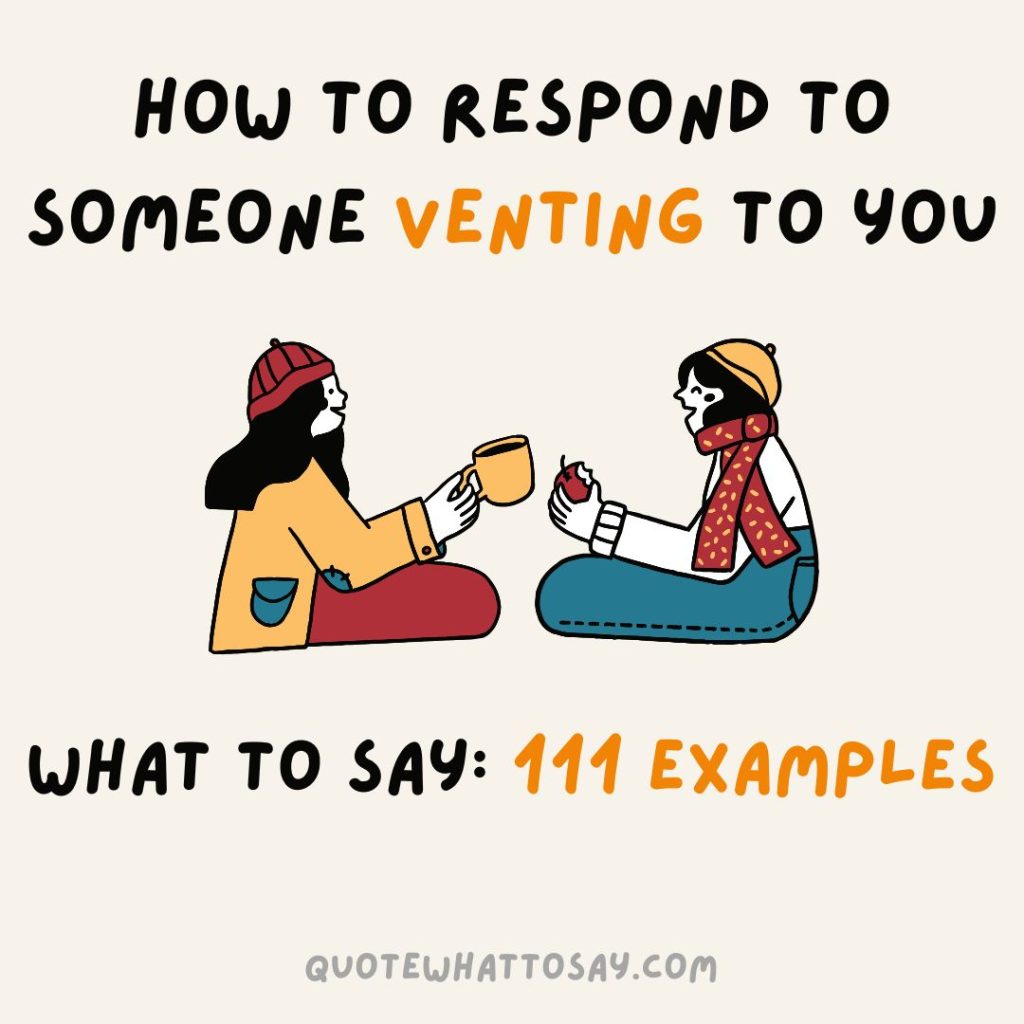In life, everyone reaches moments of stress, frustration, or emotional overload.
During these times, it is common to turn to a friend, family member, or trusted colleague to vent.
When someone opens up like this, your response matters more than you might think.
It can shape their emotional recovery, strengthen your relationship, and show that you are someone who genuinely cares.
What To Say to Someone Venting to You
Being there for someone venting does not always come naturally. You might worry about saying the wrong thing or not knowing how to help.
Here are some best ways to respond when someone is venting, including what you can say to show support and presence:

1. Create a Safe Space
When someone starts venting (about work, family, friends, life, etc), your first role is to make them feel safe.
This means showing that you are not judging, interrupting, or dismissing their feelings.
Even if their frustration seems minor or if you think they are partially to blame, this is not the moment for critique or logic.
Examples of what to say:
- “I’m here for you.”
- “I’m all ears – go ahead.”
- “Take your time – no rush.”
- “Just speak freely, I’m here.”
- “Talk to me, I’m listening fully.”
- “You can say anything. I’m listening.”
- “You can vent as much as you need.”
- “I’m here for you – say whatever’s on your mind.”
By giving this emotional green light, you let them know that their feelings are valid and that you are fully present.
Sometimes, people need to say something out loud just to hear themselves process it. Your calm and accepting presence allows them to do that.
2. Resist the Urge to Fix
One of the most common mistakes people make when someone is venting is jumping into “fix-it” mode.
It is natural – you care about them and want to help.
But during venting, people usually don’t want solutions right away. They want empathy.
The best thing you can do is listen deeply without offering advice unless they ask for it. Let them unload the emotional weight first.
These responses communicate that you understand the depth of their emotions without rushing to “solve” their problem:
- “That sounds really tough.”
- “That would’ve upset me too.”
- “I can see why that upset you.”
- “It’s okay to feel how you feel.”
- “Wow, that’s a heavy situation.”
- “Thanks for trusting me with this.”
- “That really does sound like a lot.”
- “You’re strong, and I believe in you.”
- “I can tell this really matters to you.”
- “You’ve been dealing with so much.”
- “That sounds incredibly frustrating.”
- “I see how much this matters to you.”
- “That must have taken a toll on you.”
- “I hate that this is happening to you.”
- “It makes sense that you feel this way.”
- “You’re dealing with so much at once.”
- “I’m so sorry you’re going through this.”
- “I can’t imagine how hard that must be.”
- “It’s okay to fall apart sometimes. I’ve got you.”
- “You’ve been so strong just getting through this.”
- “You’ve been through more than most would realize.”
- “You’re doing the best you can in a really hard situation.”
- “You’ve shown a lot of strength, even if it doesn’t feel like it.”
3. Mirror Their Feelings
Mirroring involves reflecting their emotions back to them so they feel seen and heard. It helps the person know that you are not just hearing words – you are tuning into the emotional experience behind them.
When you mirror effectively, it helps the person feel more connected. It also encourages them to continue opening up, which can be part of their healing process.
Examples of what to say:
- “You sound really frustrated.”
- “That really hurt you, didn’t it?”
- “You feel unheard – and that’s painful.”
- “You feel let down by them, and I get that.”
- “You seem really overwhelmed right now.”
- “That must have been really disappointing.”
- “You’re feeling stuck right now, aren’t you?”
- “You’re really angry about what happened.”
- “It seems like you are feeling overwhelmed.”
- “It sounds like you’ve been carrying this alone.”
- “You’re allowed to feel everything you’re feeling.”
- “You’re tired of pretending like everything’s okay.”
- “It sounds like your emotions are all over the place.”
- “You’re trying so hard, and it feels like it’s not enough.”
- “You’re disappointed, and that disappointment runs deep.”
- “You’re feeling unsupported by people you expected to be there.”
4. Ask Open-Ended Questions
As the conversation flows, you might want to help them explore their feelings more deeply.
Asking open-ended questions (that can’t be answered with a simple “yes” or “no”) helps guide the person to process more without steering them away from what matters to them most.
These questions keep the focus on them and their experience, without inserting your own opinions:
- “What happened next?”
- “What’s been helping you cope so far?”
- “What’s going through your mind now?”
- “How did you feel when that happened?”
- “What do you wish you could say to them?”
- “How long have you been feeling like this?”
- “What do you want to do next, if anything?”
- “What has this been like for you day-to-day?”
- “How do you usually handle things like this?”
- “What’s been the most difficult part for you?”
- “What’s been the hardest part about all this?”
- “Can you tell me more about what happened?”
- “What was the moment that really got to you?”
- “What do you wish people understood about what you’re going through?”
5. Be Fully Present
Responding well to someone venting is less about what you say and more about how you show up.
Nonverbal cues matter just as much as words. Maintain eye contact (if you are with them in person), avoid looking at your phone, and give verbal nods like “mm-hmm” or “I see” to show you’re tuned in.
Even in texts or messages, being present means responding in a timely way, using thoughtful language, and avoiding quick or distracted replies.
6. Know When to Stay Silent
Sometimes, the best response is silence.
Letting someone speak without interruption can give them the space to release more of their thoughts. You don’t need to fill every pause. Just being there can be enough.
If they are crying, you don’t have to stop it.
Don’t feel pressure to cheer them up instantly. Let them feel what they need to feel.
Examples of what to say (after a pause):
- “I’m still here.”
- “Take your time. I’m not going anywhere.”
- “This is a lot – you’re allowed to feel all of it.”
7. Offer Comfort (Not Solutions)
When the venting slows down, you might sense the person needing a little grounding.
This is where comfort comes in.
You are not solving anything – you are offering a sense of calm, kindness, and emotional reassurance.
These kinds of responses offer emotional safety and let the person know they have someone on their side:
- “You’re not alone in this.”
- “I’m here with you, no matter what.”
- “I’m proud of you for talking about it.”
- “You don’t have to go through this alone.”
- “I believe in you, even on days you don’t.”
- “Whatever you need right now, I’ve got you.”
- “You handled that situation with a lot of grace.”
- “You deserve kindness – especially from yourself.”
8. Ask What They Need Next
Once someone has vented, they may feel lighter, or they might feel raw and exposed.
This is a good moment to check in and gently shift the focus toward what they need.
Examples of what to say:
- “What do you need right now?”
- “How can I best support you today?”
- “Would it help to talk about solutions later?”
- “What do you need from me at this moment?”
- “Is there anything I can do to help you today?”
- “What would make you feel supported right now?”
- “Do you want to talk more about it, or maybe take a break?”
- “Do you want advice, or do you just need me to keep listening?”
- “Would a distraction help right now, or do you want to stay with it?”
- “Is there anything I can do to take some weight off your shoulders?”
9. What NOT to Say When Someone Is Venting To You
When someone is venting, they are looking for understanding – not correction, advice, or dismissal.
Saying the wrong thing can make them feel unheard, judged, or even ashamed for opening up.
Often, people do not need answers in that moment; they need connection.
It is important to avoid responses that minimize their experience, shift the focus to yourself, or make them feel like a burden. Instead of trying to change how they feel, simply allow them to feel it.
Statements that come across as dismissive, controlling, overly analytical, or emotionally cold can shut the person down.
Even well-meaning responses like “stay positive” can feel invalidating when someone is hurting.
If you are unsure what to say, it is usually better to say less and simply listen, rather than risk making the person feel worse.
Examples of things NOT to say when someone is venting to you:
- “Just get over it.” – Pushes for emotional closure they are not ready for.
- “Just calm down.” – Sounds controlling and dismissive of their emotional state.
- “You are overreacting.” – Invalidates their perspective and makes them feel judged.
- “You are too sensitive.” – Criticizes who they are instead of validating how they feel.
- “It’s not that big of a deal.” – Minimizes their feelings and may make them feel small.
- “You should have known better.” – Sounds blaming and adds guilt to their frustration.
- “You are always complaining.” – Dismisses the current moment and implies they are a burden.
- “You are making it worse by thinking about it so much.” – Invalidates their need to process out loud.
- “Well, at least it’s not as bad as [something worse].” – Compares pain, which rarely feels comforting.
- “This is just life. You need to toughen up.” – Cold and disconnected from their emotional experience.
- “That happened to me once, let me tell you about it.” – Shifts the focus away from them and onto yourself.
- “Can we talk about something else? This is depressing.” – Abruptly ends the conversation and may feel rejecting.
- “Everything happens for a reason.” – May feel spiritual or helpful to some, but often lacks empathy in tough moments.
- “Why didn’t you do [alternative action] instead?” – Focuses on what they “should have done” instead of what they need now.
10. Follow Up Later
Support does not stop when the venting ends.
Sending a message the next day or checking in later shows that you didn’t just listen because you were stuck in the conversation – you genuinely care.
This builds trust and deepens the connection. Small follow-ups often mean more than grand gestures.
Examples of what to say over text:
- “Anything you need today – I’m around.”
- “Still here if you ever need to vent again.”
- “I’m always here if you need to talk more.”
- “Just wanted to say I admire your strength.”
- “Sending good thoughts your way. Always here.”
- “You crossed my mind, so I wanted to reach out.”
- “Hey, just checking in – how are you feeling today?”
- “No pressure to reply – I just wanted you to know I care.”
- “I’ve been thinking about you today. How are you feeling now?”
11. How to Stop Someone from Venting to You – Know Your Limits
Supporting someone is important, but it is also okay to have boundaries.
If you are emotionally drained or don’t have the space to take in someone else’s heavy emotions, it is okay to say so gently. You can still show care without taking it all on.
Instead of shutting them down or ignoring them, let them know you care, but that you are not in the right state of mind to be supportive right now.
Offer an alternative if possible, like talking later or encouraging them to reach out to someone else they trust. You can also suggest professional help if the conversations are recurring and emotionally heavy.
Respecting your own needs helps you be a better support in the long run.
Examples of what to say:
- “Can we circle back to this when I’m in a better place to listen properly?”
- “I’m still here for you, just not in this exact moment. Can I check in soon?”
- “I want to support you fully, but I might need a little time to recharge first.”
- “You matter to me, and I want to listen fully when I’ve got the energy to do it well.”
- “I want to be helpful, not half-present. Could we talk again soon when I can focus?”
- “I think you deserve support, but I’m not in the best place to offer it at the moment.”
- “I want to be honest with you—this kind of conversation is a bit too heavy for me today.”
- “I really want to be present for this conversation. I just need to take a quick breather first.”
- “Would it be okay if we talked about something lighter for now? I’m feeling pretty drained.”
- “I hear you, and I know it’s important. I just don’t think I can give it the care it deserves right now.”
- “I’m dealing with a lot emotionally today, but that doesn’t mean I don’t want to support you.”
- “I’m feeling a bit overwhelmed, but I still want to be here for you – can we pause and come back to this?”
- “It’s been a tough day for me emotionally, and I’m not sure I can be fully present for this conversation.”
- “I don’t want to brush you off, but I can’t handle this kind of talk right now. Maybe we can revisit it later?”
- “I want to show up for you in the best way I can. Right now, I need a little time to get grounded first.”
- “I’m feeling a bit overwhelmed today and may not be the best listener at the moment. Can we talk another time?”
- “I care so much about you, and I want to give this conversation the attention it deserves – can we talk a bit later?”
- “I’m here for you, and I want to support you, but I’m feeling overwhelmed myself right now. Can we check in later?”
- “I care about you so much, and I want to give you my full attention. Can we talk in a little bit when I’m in a better headspace?”
- “I really care about you, and I want to give you my full attention – but I don’t have the emotional energy for this right now.”
How to Comfort Someone Venting
When someone vents to you, they are giving you a glimpse into their inner world. It is a powerful moment of trust.
By responding with empathy, patience, and presence, you create a safe space for them to be real – and that is a rare gift.
You don’t have to be perfect.
You don’t need all the right words.
Just showing up with kindness, humility, and an open heart is often enough.
So next time someone turns to you to vent, take a deep breath, ground yourself, and remember:
Just listen, care, and be there.





No Responses